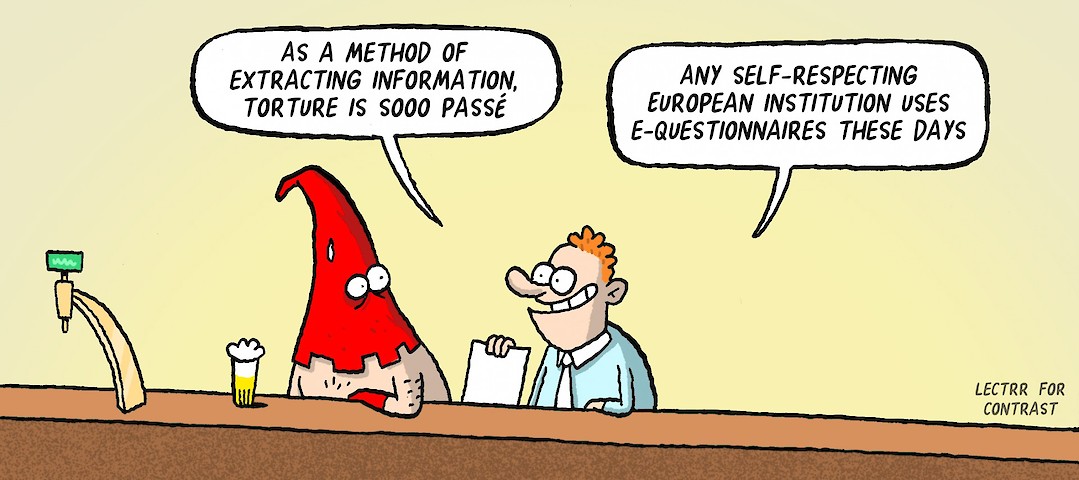In the Picture

An eQuestionnaire... and what now?
September 2016Imagine…
Your company's receptionist forwards an e-mail that arrived at the info e-mail address. It was sent by the European Commission’s Directorate-General for Competition and contains a link to an online request for information. You open the 'eQuestionnaire' with the login and password they provided. You see that it contains no fewer than 77 questions that have to be answered within a two-week period. Many of the questions require detailed input about your company and knowledge of the international market environment. You find it all a bit . . . unsettling. Very unsettling, actually. You still have ten days to go, and the eQuestionnaire notes that your company risks incurring a fine for incorrect or misleading answers.
A brief clarification.
European competition law gives the Commission the power to request from individual companies or company associations all information that is necessary for an investigation.
In every phase of the investigation, the Commission can address a request for information to companies forming the object of said investigation (e.g., a cartel investigation or one into abuse of dominant position). Such a request can also be addressed to companies that are not themselves under investigation (e.g., customers or suppliers). Thus the fact that you receive such a request does not necessarily mean that an investigation has been initiated against your company.
There are several types of information requests, ranging from a simple request (e.g., one or several questions sent by e-mail) to a formal request for information that is made by decision of the Commission. A company must respond to a formal request for information, but in theory at least it is free to decide whether or not to answer a simple request.
Note however that, if a company fails to respond to a simple request, that very fact might be interpreted as a signal that the company is unwilling to cooperate with the Commission. The Commission can then decide to send a formal request for information, which the company will then have to respond to . . .
Every information request contains a response deadline. A company that does not respond to a formal request for information by the indicated deadline can incur a fine of at most 1% of the total turnover achieved in the preceding financial year. This fine can also be imposed on a company that has provided incorrect or misleading information to the Commission, whether in connection with a formal or an informal request for information. A daily default fine for every day that the deadline set for a formal request is exceeded is also possible.
The request usually contains questions about the company's own business, about its suppliers, competitors, customers or about the sector in general. The Commission usually also asks for the production of specific documents. These can range from relatively limited information (e.g., specific contracts) to very extensive and detailed information (e.g., about specific transactions of the company in different Member States over a period of several years).
The requested information must always be necessary for the purpose of the investigation of the Commission, which therefore must indicate that purpose with a reasonable degree of precision in the request for information. Otherwise, the company cannot determine whether the requested information is in fact necessary, and the European Court of Justice is unable to exercise its judicial supervision.
Concretely.
- The best course of action is to cooperate as fully as possible with the Commission, regardless of whether a simple or formal request is involved.
- Immediately pass the request on to the legal department, which can coordinate the response, whether or not together with external legal advisors.
- Distribute the tasks and verify whether the response deadline is feasible for the personnel involved. If necessary, you can submit a motivated request for an extension of the response period.
- Verify whether it is possible to provide the scope of the requested information in the format proposed by the Commission. In general, the Commission is open for consultation about the scope and format of the information to be submitted.
- Remain aware that, in answering questions about the sector and the relevant market, you are adopting a specific position. If you wish to depart from that position at a later point in time, you will have to justify the change.
- Always submit a confidential and a public version of the response.
- When it comes to issuing requests for information, the national competition authorities have powers that are comparable to those of the Commission. Here again, the general rule is: cooperate with the competition authority.
Want to know more?
- The Commission’s power to request information from companies is based on article 18 of Regulation (EC) no. 1/2003. The fines can be found in articles 23 and 24 of the same regulation.
- You can find practical information about the eQuestionnaire via http://ec.europa.eu/competition/mergers/equestionnaire_en.html
- In a judgement of 10 March 2016, in the case C‑247/14 P HeidelbergCement AG v Commission, the European Court of Justice for the first time annulled a Commission decision to make a formal request for information, inter alia due to the excessively brief, vague and generic nature of its statement of reasons.











